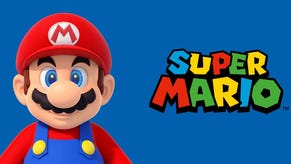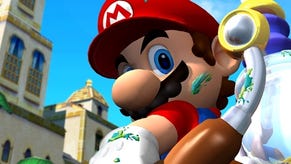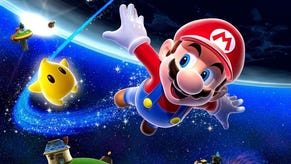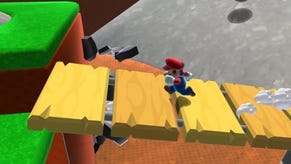Super Mario Galaxy
All's right with the Super Mario world.
Each dome - a room on the starship which forms the game's main hub - contains a handful of galaxies. Some of these will be major levels, where you'll hunt for three main stars, a hidden star and a 'comet' star. Some will be one-shot levels - a race or a stand-alone puzzle, say. Finally, there'll be a Bowser level, back in full fiendish force, Mario 64 style. The new 'comet' stars are the perfect example of the Galaxy team refusing to take the easy way out in getting the most from the worlds they have created. At any given time, a variety of comets will be in orbit around particular galaxies. These prevent you accessing the normal stars, and instead present you with a specific challenge - race a cosmic double, Shadow Mario style; face a boss with only one hit point; re-do a level with all enemies and platforms speeded up. Rather than just recycling the same content, these are well-judged tasks which emphasise the strengths of specific levels' designs.
Each of those levels may be anything from a cluster of tiny planets to a grandiose ship in a bottle, but either way there are a number of stars to collect, and what star you go 'in' on can, as you'd expect, affect the set-up of the world when you arrive. Secret stars are tucked away, rewarding those who are curious enough to see where that distant pipe goes, or disciplined enough to hoard Star Bits in case they meet any hungry bonus stars. The game is as aggressively non-linear as Mario 64 was, guaranteeing that you always have a wide variety of levels open at any one time, and uses comet challenges and hints from a perennially lost Luigi to encourage you to go back and milk additional stars from completed galaxies. And, with Trial Galaxies to unlock, and taxing high-score challenges to be met and bragged about via the Wii message board (you can take photos of your star tally and scores), Galaxy is going to be a game which is as generous with its time as it is with its space.
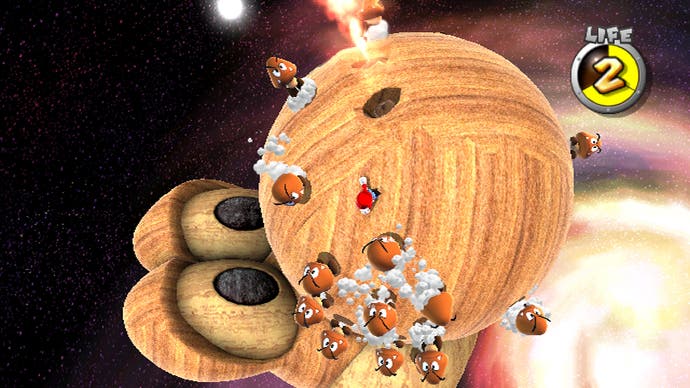
So far, so sweet. But does it matter that it's on the Wii? The basic controls certainly don't rely on anything the N64 couldn't deliver, but the two main additions do bring the remote into every aspect of the game. The first is your attack, a spin move which is triggered by a sharp, neat shake of the Remote. This is a nice instinctive touch, although it may take you a little time to adjust to the second or so cool-off time before you can unleash follow-up spin. The second is the requirement to use the Remote as a pointer to sweep up Star Bits, the game's secondary currency. While coins still operate as health, and represent your high-score for each level, Star Bits act as 1-Ups, and are crucial for unlocking hidden galaxies. Collecting them, particularly as Mario soars through the sky from a space-cannon or slingshot is narcotically satisfying, whether it's you or a second player that's doing the honours. The Remote also works wonderfully for activating the Pull-Stars, little handholds in the sky which tractor Mario towards them. Less successful are the rarer one-off modes, which see you doing things like steering a jet-ski-like ray fish by tilting the controller left and right. These come perilously close to feeling tacked on, and add little compared to simply steering with the analogue stick.
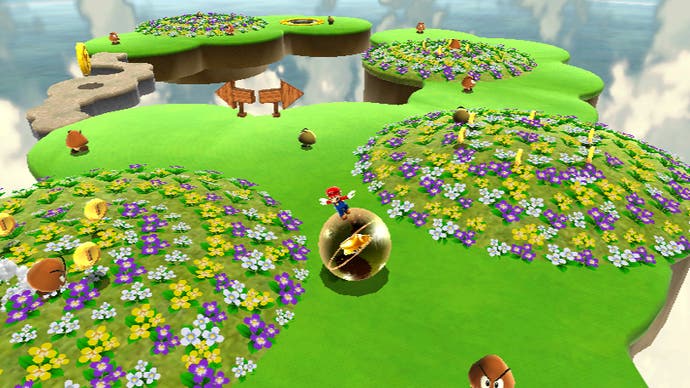
These mild annoyances with the control are the worst of the small niggles that let Galaxy down. With the health power meter now reduced from six sections to three, experimenting with new enemies and tactics can be a little fraught - try the wrong thing twice in a row and you're in immediately danger of dying. Thankfully, generous restart points, an abundance of 1-Ups from Star Bits and regular gifts of extra lives from Peach mean that there's really no reason to see the Game Over screen at any point in the 15-20 hours it will take you to finish the game's initial story arc.
More disappointing is the lack of a strong sense of identity. Many individual levels are dazzling and unforgettable, but overall the game can feel a bit fragmented. The starship in particular doesn't offer the kind of playground freedom that you want in a Mario hub area - you're never going to feel like it's home, the way Mario 64's castle still does to those of us who are hoping to go there when we die. That slight incoherence is also evident when the balance starts to tip a little too close to adventure game and a little too far from platformer. It just doesn't feel right to have Mario lighting torches to open locked doors - Link's agents are surely planning to sue. The extra costumes and cap equivalents also feel a little flimsy in their implementation - no matter how adorable Mario's fat little bee booty is, these elements just don't feel well integrated into the main game.
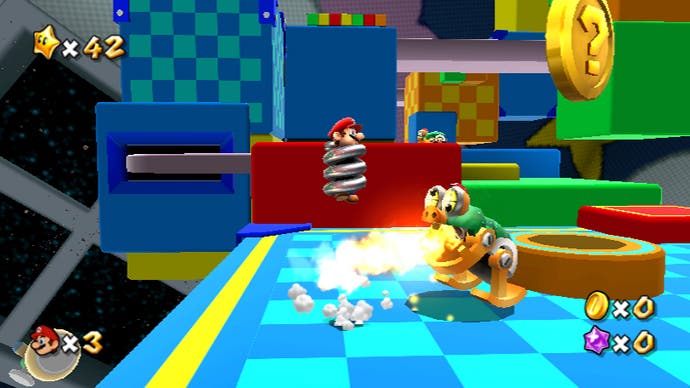
The great challenge in making a follow-up to Mario 64 was always that to do it justice, you'd have to make a game which is as much its own as Mario 64 was. That's no easy task when you also have to integrate the traditions of two decades of Mario games and the expectations of millions of fans. Sunshine, despite its dazzle, ultimately collapsed under that weight, becoming repetitive and sometimes cumbersome as it tried to find the balance. Where Galaxy matches Mario 64 is not quite in its quality of execution - alongside the brilliance of some stars are others which fall a bit flat, and there isn't the overall sense of implacable perfection that that game had - but in its confidence and originality. Another decade needs to go by before we'll know whether it will come to be as revered as 64 did. For now, all that matters is that the waiting is finally over.
